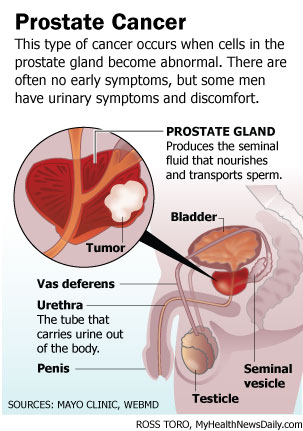
Guys: Before You Watch Football, Get a Prostate Checkup

Get the world’s most fascinating discoveries delivered straight to your inbox.
You are now subscribed
Your newsletter sign-up was successful
Want to add more newsletters?

Delivered Daily
Daily Newsletter
Sign up for the latest discoveries, groundbreaking research and fascinating breakthroughs that impact you and the wider world direct to your inbox.

Once a week
Life's Little Mysteries
Feed your curiosity with an exclusive mystery every week, solved with science and delivered direct to your inbox before it's seen anywhere else.

Once a week
How It Works
Sign up to our free science & technology newsletter for your weekly fix of fascinating articles, quick quizzes, amazing images, and more

Delivered daily
Space.com Newsletter
Breaking space news, the latest updates on rocket launches, skywatching events and more!

Once a month
Watch This Space
Sign up to our monthly entertainment newsletter to keep up with all our coverage of the latest sci-fi and space movies, tv shows, games and books.

Once a week
Night Sky This Week
Discover this week's must-see night sky events, moon phases, and stunning astrophotos. Sign up for our skywatching newsletter and explore the universe with us!
Join the club
Get full access to premium articles, exclusive features and a growing list of member rewards.
Dr. Jamin Brahmbhatt, co-director of The PUR Clinic — Personalized Urology & Robotics — at South Lake Hospital, in affiliation with Orlando Health in Clermont, Fla., and Austin Klise, communications manager at Men's Health Network, contributed this article to Live Science's Expert Voices: Op-Ed & Insights.
Gentlemen, we need to start a new tradition. We need to start taking prostate health seriously. And let's be honest — we could use a reminder. So here's an idea: Let's use the beginning of football season to kick off a new annual routine.
Before filling out our first fantasy football lineups, before settling into our recliners or firing up the grill at our first tailgate party, let's make an appointment with the doctor. It might not surprise you that a recent survey found nearly 75 percent of men watch professional football at least once a week, but only about half could remember their last trip to the doctor. Let's use something we really get excited about — the start of football season — to remind us of something we should all care more about — our health. [What Will Get Men to Stop Ignoring Their Health? (Video )]
With the rankings of favorite teams and other sports stats many of us have committed to memory through the years, men have taken the time to learn plenty about football. It's time we learn a few other numbers as well.
1 - Prostate cancer is the number 1 most common cancer in men.
2 - Prostate cancer is the second leading cause of cancer deaths in men.
605 – This is the average number of men who are diagnosed with prostate cancer every day.
Get the world’s most fascinating discoveries delivered straight to your inbox.
530 – This is the average number of men who die from prostate cancer every week.
100 – This is perhaps the most important number. Did you realize that when prostate cancer is caught in its earliest stages, the five-year survival rate is nearly 100 percent?
That's the good news. Now the bad news: Your doctor will not find prostate cancer early if you don't get checked on a regular basis, and if you wait too long, your chances of survival drop dramatically.
In fact, if cancer has spread from the prostate to more distant parts of your body, your chances of survival drop from nearly 100 percent to less than one in three.
Men's Health Network recommends that all men talk to their doctors by age 50 about getting screened, and those at a higher risk (including African American men and men with a family history) have this discussion by age 40.
To make sure you take a winning approach to your prostate health, here are a few tips:
Play an active role. When it comes to your health, it's helpful to think of yourself as the quarterback. You are in control, you call the shots, and ultimately success or failure is in your hands. Ignoring your health is like choosing to remain on the sidelines and puts you in an unwinnable situation.
Huddle with your coach. The most successful players know that in order to win, they need guidance and advice from those who understand the game at a higher level. If you're the quarterback of your health, your doctor is the coach. You should meet and strategize often, yet a recent study showed one in eight men went an entire year without seeing the doctor once. That's simply unacceptable.
Have a game plan. Prostate health and screenings can be confusing, so it helps to develop a game plan. First, know your family history and understand your risks. Get regular digital rectal exams and talk to your doctor about getting a prostate-specific antigen (PSA) test. You should know that in 2012 the U.S. Preventative Services Task Force, an independent panel of volunteer experts, recommended against PSA tests for men who had no symptoms of prostate cancer. But there are those of us who respectfully disagree. The PSA test alone may not be a definitive measure of prostate health, but it does provide useful information. At the very least, doctors can use PSA results as a baseline measure in some patients, and in others, we can use more sophisticated tools to analyze specific markers found in the PSA test more closely.
Detecting prostate cancer isn't always easy , so it's important to develop a game plan that takes advantage of all the tools at your disposal in order to detect and beat this illness.
Think of your teammates. Like the football players we admire, as men we tend to think of ourselves as tough, resilient and often indestructible. The challenge, though, is to think about more than ourselves. When we ignore our health or choose to avoid the doctor, those who depend on us most, like our spouses and children, often pay the price.
If you don't want to go to the doctor for yourself, do it for them. And start this fall, before football season gets in full swing.
Follow all of the Expert Voices issues and debates — and become part of the discussion — on Facebook, Twitter and Google+. The views expressed are those of the author and do not necessarily reflect the views of the publisher. This version of the article was originally published on Live Science.
 Live Science Plus
Live Science Plus












